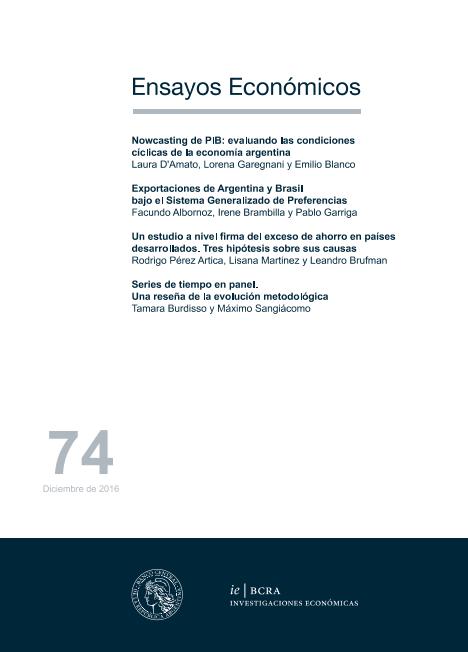Artículo
En este trabajo investigamos el impacto del Sistema Generalizado de Preferenciasimplementado por Estados Unidos sobre las exportaciones de Argentina y de Brasil. Nuestra evidencia indica que el SGP incrementó las exportaciones de estos países hacia Estados Unidos, tanto en las cantidades exportadas (margen intensivo) como en el hecho de que un producto sea exportado o no (margen extensivo). El efecto, sin embargo, es más importante cuanto más ventajoso es elbeneficio respecto al nivel inicial de aranceles. Mostramos también que la cancelación del SGP conlleva caídas en las exportaciones. Este hallazgo señala que la ventaja otorgada por SGP no se manifiesta en mejoras competitivas que hagan redundante su existencia. Asimismo, encontramos que los productos incluidos en el SGP aumentan sus exportaciones en otros destinos, especialmente en la OECD; región con mercados similares al de los Estados Unidos. Este resultado sugiere ventajas asociadas con mayor actividad y experiencia en mercados de países avanzados como el de Estados Unidos. Finalmente, observamos que el SGP promueve exportaciones de los bienes favorecidos a expensas de bienessimilares no incluidos en el acceso preferencial. Este resultado reduce, al menos parcialmente, el efecto pro-exportaciones del SGP y pone en evidencia desvíos potenciales de comercio, incluso para un mismo país exportador, que estos programas pueden generar. In this paper we investigate the impact of the Generalized System of Preferences implemented by the United States on exports of Argentina and Brazil. Our evidence indicates that the GSP increased exports from these countries to the United States, both in export quantities (intensive margin) and the fact that a product is exported or not (extensive margin). The effect, however, is more important the more advantageous is the benefit from the initial level of tariffs. We also show that the cancellation of the GSP involves falls in exports. This finding indicates that the advantage conferred by GSP does not manifest itself in competitive improvements that make redundant their existence. We also find that the products included in the GSP increase its exports in other destinations, especially in the OECD; region similar to the United States market. This result suggests advantages associated with increased activity and experience in markets in advanced countries such as the United States. Finally, we note that the GSP promotes exports of goods favored at the expense of similar goods not included in the preferential access. This result reduces, at least partially, the effect pro-GSP exports and highlights potential trade diversion, even for the same exporting country, these programs can generate.
Exportaciones de Argentina y Brasil bajo el Sistema Generalizado de Preferencias
Título:
Exports of Argentina and Brazil under the Generalized System of Preferences
Fecha de publicación:
12/2016
Editorial:
Banco Central de la República Argentina
Revista:
Ensayos Económicos
ISSN:
0325-3937
Idioma:
Español
Tipo de recurso:
Artículo publicado
Clasificación temática:
Resumen
Palabras clave:
Exportaciones
,
Sistema-Generalizado-De-Preferencias
,
Sgp
Archivos asociados
Licencia
Identificadores
Colecciones
Articulos(CCT - LA PLATA)
Articulos de CTRO.CIENTIFICO TECNOL.CONICET - LA PLATA
Articulos de CTRO.CIENTIFICO TECNOL.CONICET - LA PLATA
Articulos(IIEP)
Articulos de INST. INTER. DE ECONOMIA POLITICA DE BUENOS AIRES
Articulos de INST. INTER. DE ECONOMIA POLITICA DE BUENOS AIRES
Citación
Albornoz, Facundo; Brambilla, María Irene; Garriga, Pablo; Exportaciones de Argentina y Brasil bajo el Sistema Generalizado de Preferencias; Banco Central de la República Argentina; Ensayos Económicos; 74; 12-2016; 27-55
Compartir




